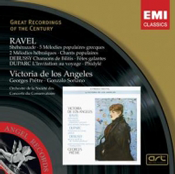As a Spanish
singer in a French opera set in Spain, her interpretation had an organic integrity that added
authenticity to the operatic visit to her home country.
We enjoy a similar musical voyage on this EMI re-release of songs by Ravel, Debussy and
Duparc. The Ravel songs provide an ethnic travelogue in Tristan Klingsor’s fantastic text to
Shéhérazade and in actual ethnic songs from around the Mediterranean region in the Cinq
Mélodies Populaires Grecques, the Chants Populaires, and the Deux Mélodies Hébraïques. The
Debussy songs provide imaginary time travel to the worlds of Watteau paintings in the Fêtes
Galantes and to an imaginary ancient Greece in the Chansons de Bilitis. The Debussy songs and
the Ravel Chants Populaires are accompanied by Gonzalo Soriano on the piano; the rest have
orchestral accompaniment.
These songs were recorded in 1963 and 1967 when the singer was in her prime vocally and we
hear none of the roughness that crept in as financial concerns caused her to extend her career.
Still, it has to be acknowledged that in the upper registers, her voice, while retaining a beautiful
purity, does not really blossom. Thus the sound that transports some listeners does not excite
everyone. To my ear, this pure tone works very well in most of this repertoire. Ravel’s ethnic
songs have a directness from which a heavier vibrato would detract. Thus the Chants
Populaires, infrequently recorded, are very successful. The ubiquitous Cinq Mélodies
Populaires Grecques bring out the endearing warmth of her personality, but the orchestral
accompaniment, while adding color, perhaps makes a bigger production of these songs than they
should have (only two of the orchestrations are by Ravel himself). The Deux Mélodies
Hébraïques are simple and, especially in the case of the Kaddisch, worshipful. A quick
comparison with Cecilia Bartoli’s performance of these songs and the Chants Populaires on her
1996 Chant d’Amour disc shows Bartoli having a richer sound but less clearly understandable
texts. Bartoli also sings these songs in Hebrew rather than French, and noticeably modifies her
voice to sound childlike in the son’s section of the dialogue in the Chanson Hebraïque.
There is also much to like in De los Angeles’s performance of the Debussy songs. Again, the
purity and containment of her vocal sound bring out the ironic detachment as well as the charm
of the Fêtes Galantes set. Her performance of the Chansons de Bilitis beautifully evokes what
Graham Johnson calls their “Delphic spirituality”, where the eroticism is “veiled, understated,
and under-age”. Her ability to sound vulnerable while using her whole voice draws us into the
heart of the young woman encountering the birth, consummation and death of erotic passion.
Again, one can compare with more recent performances. Dawn Upshaw on her 2004 Voices of
Light presents a more sharply defined emotional range: more intensely passionate in “La
Chevelure,” while backing off the (already fairly transparent) sound to sound more childlike in
places. By contrast, René Fleming on her 2001 Night Songs has a less focused sound with more
pronounced legato than either of the others. There is more shimmer in the higher registers, but
less personality in the interpretation. De los Angeles’s final Debussy song is the troubled “Noël
des enfants qui n’ont plus de maison”, written by the aged Debussy in horror at the devastation of
World War I. Again, De los Angeles’s sincerity and pure timbre allow her to sing unaffectedly
as one of the displaced children regretting the loss of “our little beds” (as well as the rest of their
villages, families, and daily lives).
It is in the Ravel Shéhérazade, and the orchestrated Duparc songs that admirers of a richer
sounding voice may be disappointed in this program. In the expansive “Asie”, which opens the
entire disc and describes a fantasy voyage across the continent, exploring every dark nook and
cranny before returning home to tell one’s friends about it, the changing colors of the travelogue
are heard in the orchestra rather than in the singer’s voice. However, the two more intimate
songs that follow are quite effective, particularly when one takes into account that they both deal
with erotic passion that under the circumstances cannot or will not be pursued, so the singer’s
contained sound works well.
There is no faulting de los Angeles’s emotion, musicality or technique in the Duparc songs that
close the disc. Duparc himself might object to the performance, since he apparently was annoyed
to hear a woman’s voice sing a man’s song. And of course, those who are drawn to Duparc
among French composers because he is more like their real love, Wagner, than many others, will
want to hear a bigger vocal sound than de los Angeles offers. Nevertheless, she does bring off
the intimacy of the opening of “Phydilé” very well, and when the sonic landscape opens out in
the climax, she is able to fill it effectively without pushing her voice, reminding us once again of
her very successful operatic career.
It should be noted that this disc, released as part of EMI’s “Great Recordings of the Century”
series, has been completely remastered at Abbey Road studios. Fans of Victoria de los Angeles
should know that all of these performances are also available on the multi-disc set entitled The
Fabulous Victoria de los Angeles. Since I had that set already, I compared some of the tracks on
my own equipment and that of my audiophile brother-in-law, and he and I both agreed that her
middle voice in particular is better captured on the older discs, so I wouldn’t advise buying this
disc if you have the older set, or are enough of a fan to consider acquiring it (last I checked it’s
still available). The new release includes a 2006 essay by John Steane (in English and in German
translation) discussing the songs and the singer, as well as texts and German and English
translations of the songs.
Barbara Miller
